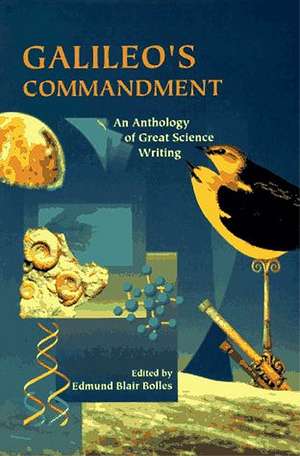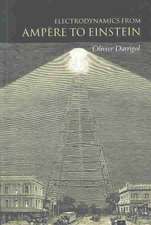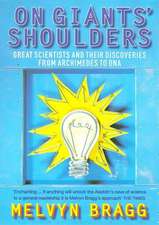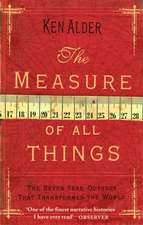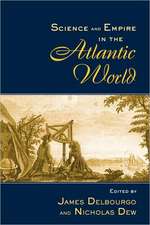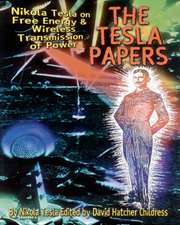Galileo's Commandment: 2,500 Years of Great Science Writing
Editat de Edmund Blair Bollesen Limba Engleză Paperback – 30 sep 1999
Bolles has scoured the literature of science to build a treasury that is accessible and riveting, and therefore appealing to readers unfamiliar with science, yet erudite enough for the scientifically initiated to enjoy.
Preț: 192.26 lei
Nou
36.79€ • 39.34$ • 30.67£
Carte disponibilă
Livrare economică 27 martie-10 aprilie
Specificații
ISBN-10: 0805073493
Pagini: 512
Dimensiuni: 155 x 230 x 31 mm
Greutate: 0.73 kg
Editura: Holt McDougal
Notă biografică
Cuprins
Introduction
Part One
The Scientific Imagination Examined
Chapter One
"Every Real Problem Can and Will Be Solved"
Isaac Asimov: Death in the Laboratory (1965)
Arthur S. Eddington: The Story of Algol (1927)
Ernst Mach: A New Sense (1897)
John B. Watson: The New Science of Animal Behavior (1909)
Chapter Two
"Language of the Sort That Would Have Attracted Gilbert and Sullivan"
Karl Popper: Heroic Science (1974)
John McPhee: Naming the Rocks (1981)
Herbert Butterfield: Chemistry Transformed (1949)
Jean Piaget: Learning to See Through Another's Jean Piaget: Learning to See Through Another's Eyes (1928)
Chapter Three
"The Actual Limits of What Is Known"
Stephen Jay Gould: The Misuse of Darwin (1981)
Noam Chomsky: The Case Against B. F. Skinner (1971)
Francis Bacon: Idols of the Tribe (1620)
Part Two
The Scientific Imagination in Action
Chapter Four
"Brought Near to That Great Fact-That Mystery of Mysteries"
Galileo Galilei: First Look Through a Telescope (1610)
Leonardo da Vinci: Seashells in the Mountains (1480-1515)
Charles Darwin: Birds of the Galapagos (1839)
George B. Schaller: Mating Seasons (1980)
p0Chapter Five
"But What Are They?"
Herodotus: The Creation of Egypt (444 B.C.)
Horace Bénédict de Saussure: The Movement of Glaciers (1796)
James Clerk Maxwell: Molecules (1873)
Robert Kennedy Duncan: Radio-Activity: A New Property of Matter (1902)
I. P. Pavlov: The Atoms of Activity (1924)
Annie J. Cannon: Classifying the Stars (1926)
Chapter Six
"The Demonstration That Cost So Much Effort"
Galileo Galilei: Where Is the Center of the Universe? (1632)
Robert Boyle: Doubting the Four Elements (1661)
Isaac Newton and Robert Hooke: Dispute on the Nature of Light (1672)
Marie Curie: Obtaining Radium (1923)
Alfred Wegener: Jigsaw Continents (1929)
Ernest Rutherford: The Transmutation of the Atom (1933)
James Watson: The Double Bases (1968)
Carl Sagan: Has the Earth Already Been Visited? (1973)
Walter Sullivan: Looking for the Drift (1974)
George Smoot: Looking for the Big Bang (1994)
Chapter Seven
"Those Who Would Judge the Book Must Read It"
Johannes Kepler: I Admit the Moon Has Seas (1610)
Voltaire: The Importance of Isaac Newton (1733)
Thomas H. Huxley: The Darwinian Hypothesis (1859)
William Bateson: Galton's Genetics (1909)
Edmund Blair Bolles: Gestalt Psychology (1991)
Bertrand Russell: What Einstein Did (1925)
J. Robert Oppenheimer: A Science in Change (1953)
Chapter Eight
"Somehow the Wave Had to Exist"
Sir James Jeans: The End of the Universe (1929)
Frederic C. Bartlett: Imagery in Though (1932)
Gordon W. Allport: The Mature Personality (1937)
Fred Hoyle: The Expanding Universe (1950)
Loren C. Eiseley: Little Men and Flying Saucers (1953)
Werner Heisenberg: Atomic Physics and Causal Law (1958)
Richard Feynman: The Distinction of Past and Future (1965)
Edward Harrison: The Golden Walls of Edgar Allan Poe (1987)
Fred Alan Wolf: Waves Without a Breeze (1986)
Heinz R. Pagels: Making the Observer Count (1982)
Paul Davies: Schrödinger's Cats and Wigner's Friends (1980)
Chapter Nine
"Every Intellect Which Strives After Generalization Must Feel the Temptation"
Antoine-Laurent Lavoisier: Preface to The Elements of Chemistry (1789)
Alfred Wallace: On the Tendency of Varieties to Depart Indefinitely from the Original Type (1859)
Hermann von Helmholtz: The Conservation of Energy (1863)
Albert Einstein: Two Theories of Relatively (1916)
Part Three
Style in the Scientific Imagination
Chapter Ten
"It Is in Some Fashion a History"
Galileo Galilei: The Speed of Falling Bodies (1638)
Lucretius: The Persistence of Atoms (60 B.C.)
J. B. S. Haldane: Food Control in Insect Societies (1928)
Julian Huxley: Animals Courting (1943)
Rachel Carson: The Long Snowfall (1951)
Louise B. Young: How Ice Changed the World (1983)
Richard Preston: Dark Time (1987)
Primo Levi: Carbon (1975)
Acknowledgments
